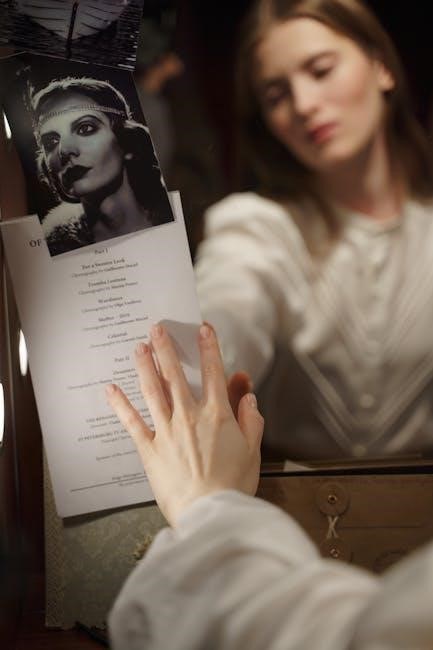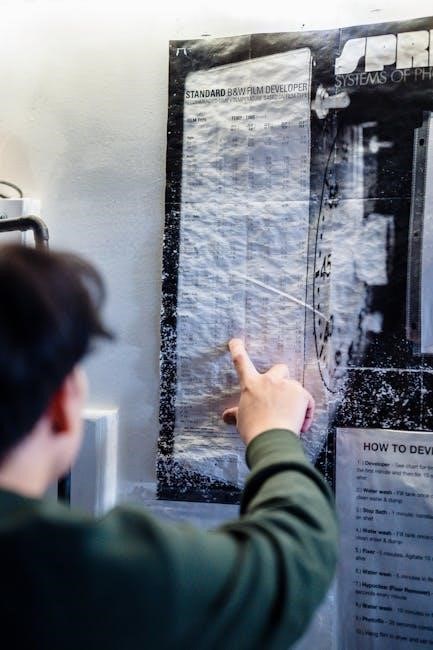Act 3 of Romeo and Juliet is a pivotal section‚ marked by a fatal duel‚ emotional turmoil‚ and significant consequences. It escalates the conflict‚ deepening the tragedy.
1.1 Overview of Act 3
Act 3 of Romeo and Juliet unfolds with escalating tension and tragic events. The act begins with a deadly confrontation between Tybalt and Mercutio‚ leading to Mercutio’s death and Romeo’s impulsive revenge. Romeo slays Tybalt‚ resulting in his banishment from Verona. Juliet faces emotional turmoil upon learning of Tybalt’s death and Romeo’s fate‚ while the Nurse’s loyalty is tested as she struggles to support Juliet. These events set the stage for the play’s heartbreaking conclusion‚ intensifying the conflict and emotional stakes.
1.2 Significance of Act 3 in the Play
Act 3 is a turning point in Romeo and Juliet‚ intensifying the tragic momentum. It showcases the devastating consequences of impulsive actions and deepens the conflict between love and hate. The fatal fight‚ Romeo’s banishment‚ and Juliet’s emotional turmoil highlight the inevitability of fate. This act accelerates the play’s tragic progression‚ setting the stage for the heartbreaking conclusion. It underscores the destructive nature of revenge and the enduring power of love amidst chaos‚ making it pivotal to the play’s emotional and thematic development.

Scene 1: The Fatal Fight
Tybalt and Mercutio’s confrontation triggers a tragic chain of events. Romeo refuses to fight Tybalt‚ but Mercutio steps in‚ leading to his fatal stabbing. Benvolio intervenes‚ and Romeo‚ filled with fury‚ ultimately kills Tybalt‚ intensifying the conflict.
2.1 The Confrontation Between Tybalt and Mercutio
Tybalt‚ seeking revenge‚ confronts Mercutio‚ who mocks him relentlessly. The tension escalates as Mercutio provokes Tybalt‚ leading to a duel. Despite Romeo’s attempts to intervene‚ Tybalt fatally stabs Mercutio‚ sparking chaos and grief. Mercutio’s dying curse haunts both families‚ while Benvolio rushes to inform Romeo of the tragedy‚ setting the stage for further violence and consequences.
2.2 Romeo’s Refusal to Fight Tybalt
Romeo refuses to fight Tybalt‚ citing their secret familial bond through his marriage to Juliet. He attempts to calm the situation‚ urging peace and reasoning with both Tybalt and Mercutio. Despite Mercutio’s provocation‚ Romeo remains steadfast in his decision‚ believing violence would betray his love for Juliet. His refusal frustrates Mercutio‚ who steps in to fight Tybalt‚ leading to tragic consequences. Romeo’s choice highlights his internal conflict between loyalty to friends and commitment to his newfound family ties.
2.3 Mercutio’s Death and Its Aftermath
Mercutio is fatally stabbed by Tybalt during the duel. As he dies‚ he curses both the Montague and Capulet families; Benvolio informs Romeo of Mercutio’s death‚ enraging him. Romeo confronts and kills Tybalt in a heated duel. Realizing the consequences‚ Benvolio urges Romeo to flee before authorities arrive. Mercutio’s death intensifies the feud and leads to Romeo’s banishment‚ escalating the tragic events of the play and forever altering the characters’ fates. This moment marks a turning point in the story’s descent into tragedy.

Scene 2: Romeo’s Banishment
Romeo is banished after killing Tybalt‚ separating him from Juliet and escalating the families’ conflict. His exile intensifies the tragic divide between the lovers and their families.
3.1 Romeo’s Reaction to Banishment
Romeo‚ devastated by his banishment‚ believes exile is worse than death. He fears separation from Juliet and the loss of his identity‚ overwhelmed by despair and hopelessness. His emotional turmoil reflects the harsh reality of his fate‚ adding depth to his character’s tragic plight and highlighting the play’s themes of love and loss. His reaction underscores the irreversible consequences of impulsive actions and the unyielding familial feud.

3.2 The Friar’s Advice to Romeo
Friar Laurence advises Romeo to remain patient and hide in Mantua‚ urging him to wait until the situation calms. He assures Romeo that he will work to resolve the conflict and reunite him with Juliet. The Friar emphasizes the importance of hope and faith‚ contrasting Romeo’s despair with his own calm resolve. His guidance reflects his belief in the power of time and wisdom to overcome adversity‚ offering Romeo a glimmer of hope amidst his banishment and heartbreak.

Scene 3: Juliet’s Emotional Turmoil
Juliet experiences intense grief and anger over Tybalt’s death‚ while also feeling conflicted about her love for Romeo‚ creating a storm of emotions within her.
4.1 Juliet’s Reaction to Tybalt’s Death
Juliet is torn between grief over Tybalt’s death and loyalty to Romeo. She initially condemns Romeo for the killing but later defends him‚ showing her conflicting emotions. Her love for Romeo overrides her family ties‚ leading her to plead for his understanding and support. This internal struggle highlights her deep emotional turmoil and the strength of her bond with Romeo despite the tragic circumstances surrounding them.
4.2 Juliet’s Conflicting Emotions Toward Romeo
Juliet experiences a profound inner conflict regarding Romeo after Tybalt’s death. Initially‚ she is angered by Romeo’s actions‚ condemning him for killing her cousin. However‚ her love for Romeo soon overpowers her anger‚ leading her to defend him and justify his actions; This emotional struggle reflects her deep loyalty to Romeo and her inability to reconcile her family’s hatred with her personal feelings‚ showcasing the complexity of her character and the tragic nature of their situation.

Scene 4: The Nurse’s Role
The Nurse plays a crucial role in Scene 4‚ delivering tragic news to Juliet and expressing her own grief. Her loyalty and emotional turmoil are central.
5.1 The Nurse’s Confusion and Grief
The Nurse is overwhelmed with confusion and grief as she delivers the tragic news of Tybalt’s death and Romeo’s banishment to Juliet. Her loyalty to Juliet is evident‚ but she struggles to reconcile her emotions‚ expressing deep sorrow and frustration. The Nurse’s grief is intense‚ as she mourns the loss of Tybalt and fears for Juliet’s future. Her emotional turmoil adds to the tragic atmosphere‚ highlighting the devastating consequences of the feud and the impulsive actions of the characters.
5.2 The Nurse’s Impact on Juliet’s Decision
The Nurse’s words inadvertently influence Juliet’s decision‚ as she initially advises Juliet to marry Paris‚ believing it practical. However‚ when Juliet resolves to defy her parents‚ the Nurse‚ though confused and grieving‚ ultimately supports her. The Nurse’s loyalty to Juliet shines through‚ even as her conflicting advice highlights the complexity of the situation. Her influence underscores Juliet’s determination to follow her heart‚ despite the tragic consequences unfolding around her.

Character Motivations
Romeo is driven by love and loyalty‚ Juliet by devotion and defiance‚ while Tybalt seeks revenge‚ fueling the tragic events with their intense‚ conflicting desires.
6.1 Romeo’s Motivations in Act 3
Romeo’s actions in Act 3 are driven by his loyalty to Mercutio and his forbidden love for Juliet. His refusal to fight Tybalt stems from his secret marriage‚ but upon Mercutio’s death‚ rage overtakes him‚ leading to Tybalt’s slaying. Romeo’s motivations shift from peaceful resolve to vengeful passion‚ ultimately sealing his fate and banishment‚ showcasing his complex emotional journey and tragic flaws. His love and loyalty clash with impulsive decisions‚ defining his character in this act.
6.2 Juliet’s Motivations in Act 3
Juliet’s motivations in Act 3 are rooted in her deep love for Romeo and her struggle to reconcile her family’s hatred for him. Upon learning of Tybalt’s death‚ she is torn between grief and loyalty to Romeo. Her conflicting emotions lead her to defend Romeo against her family’s anger‚ showcasing her unwavering dedication to their love. Juliet’s resolve to defy her parents and refuse Paris highlights her growing independence and willingness to risk everything for Romeo‚ ultimately intensifying the tragic consequences of their situation.
6.3 Tybalt’s Motivations in Act 3
Tybalt’s motivations in Act 3 stem from his deep-seated hatred for the Montagues and his desire to uphold his family’s honor. He is driven by a fierce loyalty to the Capulets and seeks revenge against Romeo for attending the ball. Tybalt’s impulsiveness and aggression lead him to provoke Mercutio and Romeo‚ resulting in the fatal fight. His actions are fueled by a need to prove his worth and protect his family’s reputation‚ ultimately contributing to the tragic events that unfold.

Themes in Act 3
Themes in Act 3 include fate‚ loyalty‚ and impulsiveness‚ driving the tragic events. Mercutio’s death and Romeo’s banishment highlight the destructive nature of unchecked emotions and rivalry.
7.1 The Theme of Fate
Fate plays a central role in Act 3‚ as characters face unavoidable destinies. Romeo’s banishment and Mercutio’s death underscore the inevitability of their tragic outcomes‚ shaped by prior choices and family feuds. The characters’ attempts to defy fate only accelerate their downfall‚ highlighting Shakespeare’s exploration of destiny’s power. This theme intertwines with the impulsive decisions‚ reinforcing the sense of inescapable tragedy that defines the play’s progression.
7.2 The Theme of Loyalty
Loyalty is a significant theme in Act 3‚ as characters exhibit unwavering dedication to their loved ones and factions. Mercutio’s loyalty to Romeo leads to his fatal confrontation with Tybalt. Romeo‚ in turn‚ avenges Mercutio‚ showcasing loyalty to his friend. Juliet remains loyal to Romeo despite her family’s anger‚ while the Nurse’s loyalty to Juliet is tested by the tragic events. These acts of loyalty highlight the characters’ commitment to their relationships‚ even when faced with devastating consequences.
7.3 The Theme of Impulsiveness
Impulsiveness in Act 3 drives the tragic events forward. Romeo’s impulsive decision to kill Tybalt leads to his banishment‚ while Tybalt’s own rash actions spark the deadly confrontation. Mercutio’s fiery temper accelerates the conflict‚ and Juliet’s impulsive choice to fake her death highlights the emotional intensity. These impulsive acts underscore how quick decisions‚ driven by emotion rather than reason‚ propel the characters toward their doomed fate‚ intensifying the play’s tragic momentum and illustrating the destructive power of unchecked emotions.

Key Vocabulary and Literary Devices
Shakespeare employs vivid imagery and metaphors in Act 3‚ enriching the narrative with emotional depth. Key terms like “banished‚” “fate‚” and “loyalty” are central to understanding the play’s themes. Additionally‚ dramatic irony heightens tension‚ such as when Juliet’s parents remain unaware of her secret marriage. These literary devices enhance the tragic atmosphere‚ immersing readers in Verona’s conflicted world and amplifying the emotional impact of the characters’ struggles; The language and techniques used underscore the inevitability of the tragic outcome‚ making Act 3 a masterclass in dramatic storytelling.
8.1 Key Vocabulary to Understand Act 3
Key terms in Act 3 include banished (Romeo’s punishment)‚ fate (foreshadowing tragedy)‚ loyalty (to family or love)‚ impulsive (Romeo’s actions)‚ and tragedy (Mercutio’s death). Understanding soliloquy (Juliet’s emotional monologue)‚ oath (promises made)‚ and reckless (Tybalt’s behavior) aids comprehension. These words highlight themes of conflict‚ love‚ and inevitability‚ enriching the dramatic tension and character development in Act 3.
8.2 Literary Devices Used in Act 3
Shakespeare employs vivid imagery‚ metaphors‚ and dramatic irony in Act 3. Romeo’s soliloquy in the friar’s cell showcases emotional depth; Juliet’s metaphorical language highlights her internal conflict. The fight between Mercutio and Tybalt uses foreshadowing‚ hinting at tragedy. Dramatic irony occurs when the audience knows Mercutio’s fate before Romeo. These devices intensify tension‚ emphasize themes of fate and loyalty‚ and prepare the audience for the play’s tragic conclusion‚ enhancing the emotional impact of the unfolding drama.

Study Questions for Act 3
- What motivates Tybalt to confront Romeo?
- How does Mercutio’s death impact Romeo?
- Why does Romeo refuse to fight Tybalt initially?
- What advice does the Friar give Romeo?
- How does Juliet react to Tybalt’s death?
9.1 Questions on Scene 1
- Why does Benvolio predict a fight at the beginning of Scene 1?
- What motivates Tybalt to confront Romeo?
- How does Mercutio respond to Tybalt’s insults?
- Why does Romeo refuse to fight Tybalt?
- What role does Romeo play in Mercutio’s death?
- How does Mercutio’s death change Romeo’s behavior?
- What is the consequence of Romeo killing Tybalt?
9.2 Questions on Scene 2
- How does Romeo react to the news of his banishment?
- What advice does Friar Laurence offer Romeo in this scene?
- Why does Romeo believe banishment is worse than death?
- How does Romeo’s emotional state reflect his internal conflict?
- What does the Friar mean by “be patient”?
- How does Romeo’s banishment affect his relationship with Juliet?
- What does this scene reveal about Romeo’s character development?
9.3 Questions on Scene 3
- How does Juliet react to the news of Tybalt’s death?
- What causes Juliet’s emotional turmoil in this scene?
- How does Juliet reconcile her love for Romeo with her anger at his actions?
- What role does the Nurse play in Juliet’s decision-making process?
- How does Juliet’s relationship with her parents evolve in this scene?
- What does Juliet’s soliloquy reveal about her inner conflict?
- How does this scene foreshadow future events in the play?
9.4 Questions on Scene 4
- How does the Nurse’s confusion and grief impact Juliet’s decision-making?
- What advice does the Nurse initially give to Juliet‚ and why?
- How does the Nurse’s loyalty to Juliet conflict with her own emotions?
- What does the Nurse’s behavior reveal about her character?
- How does the Nurse’s interaction with Juliet reflect the play’s themes of loyalty and conflict?
- What role does the Nurse play in Juliet’s growing determination?
- How does the Nurse’s presence influence the tragic outcome?
Act 3 is a turning point‚ intensifying the tragic events and setting the stage for the play’s inevitable conclusion‚ highlighting fate‚ loyalty‚ and impulsive decisions.
10.1 Summary of Key Events in Act 3
In Act 3‚ Tybalt kills Mercutio‚ prompting Romeo to slay Tybalt and face banishment. Juliet learns of Tybalt’s death and Romeo’s exile‚ causing her immense grief. Her parents arrange her marriage to Paris‚ escalating her desperation. Juliet seeks help from the Nurse and Friar Laurence‚ leading to her plan to fake death. The Nurse’s confusion further complicates Juliet’s emotional turmoil‚ while Romeo’s banishment sets the stage for the tragic events to come.
10.2 The Impact of Act 3 on the Rest of the Play
Act 3 drastically alters the play’s trajectory‚ intensifying the tragic momentum. Romeo’s banishment and Tybalt’s death create irreparable divisions‚ while Juliet’s desperation grows with her forced engagement to Paris. The emotional turmoil and impulsive decisions in Act 3 set the stage for the play’s heartbreaking conclusion. The characters’ fates become increasingly intertwined‚ leading to a series of events that ultimately seal their tragic destiny‚ leaving no possibility for a harmonious resolution.
